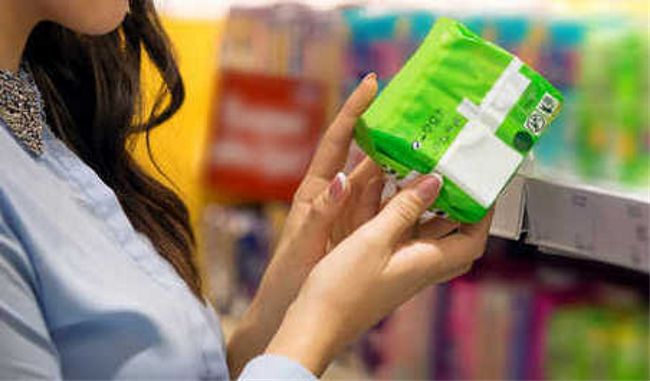
Photo for representation only.
New Delhi, November 23
High amounts of chemicals linked with heart disorders, diabetes and cancer, have been found in popular sanitary napkins sold in India, according to a study done by a Delhi-based environmental NGO.
The study by NGO, Toxics Link, found the presence of phthalates and volatile organic compounds ( VOCs) in a total of ten samples, six inorganic and four organic sanitary pads available in the market.
The findings were published in a report titled 'Menstrual Waste 2022'.
Exposure to phthalates have been linked to a variety of health concerns including endocrine disruption, impacts to the heart and reproductive systems, diabetes, some cancers, and birth defects.
Exposure to VOCs increases the risk of brain impairment, asthma, disabilities, certain cancers, and the proper functioning of the reproductive system.
Highest amounts of phthalates were found in self-proclaimed 'organic' sanitary napkins, the study found.
According to the study, all types of sanitary napkins, organic and inorganic, tested positive for the presence of phthalates.
Among phthalates, the maximum concentration was of DIDP, a type of phthalate, at 19,460 µg/kg in a self-claimed organic pad.
Concentrations of a combination of phthalates were found to be 0.0321 and 0.0224 gram in an organic and an inorganic sample, respectively, which is greater than 0.1 per cent by the weight of the product mandated under the EU regulations, said the study.
Sanitary napkin samples were checked for the presence of a total of 25 VOCs out of which, compounds such as acetone, chloroform, Benzene, toluene, and others were detected in all the samples, inorganic and organic.
The study also said it was shocking to find high levels of VOCs in all the organic samples, thus breaking the understanding that the organic pads are safer.
Menstruators, or people who menstruate, need safe menstrual products that help them in carrying out their daily activities without physical limitations. Currently, disposable sanitary pads are the most popular menstrual products worldwide, the study said.
Most menstruators use sanitary pads as a first-choice product for an estimated average of 1,800 days in their lifetime.
In recent years, among other changes, synthetic plastic materials have been added to sanitary pads as liquid absorbent to enhance functioning and improve softness.
Another addition to sanitary pads is fragrance, in order to provide the user a feeling of freshness.
Now, there is a growing concern that some of these chemicals, which are component of sanitary pads, may affect user's health.
A total of 10 samples, six inorganic and four organic sanitary pads were sent for testing and the results for VOCs and phthalates were analysed weight-wise (µg/kg), which were then converted to pad-wise concentrations. The average weight of a pad was taken to be around 10 grams.
The menstrual pads were tested for phthalates such as DIBP, DBP, DINP, DIDP and others.
Exposure to chemicals through sanitary pads is also of critical concern because of the exposure route site, i.e. vaginal area, and the long-term exposure period. As a mucous membrane, the vagina is capable of secreting and absorbing fluids at a higher rate than skin.
Emphasising that menstruators deserve access to safe menstrual products in the market and have the right to know what they are exposed to, the study made some recommendations in that regard.
First, the study recommends a thorough investigation into the presence and potential impact of VOCs and phthalates in menstrual products to the menstruators. Second, the government and standards making bodies should be framing standards for chemicals in sanitary products.
Third, it should be mandatory for producers to disclose the list of product ingredients. Fourth, responsible advertising to ensure producers provide relevant information and adequate warnings on the product.
Finally, the study recommends regulations and schemes to promote substitution or reduction in the use of these chemicals in the products.
Join Whatsapp Channel of The Tribune for latest updates.



























